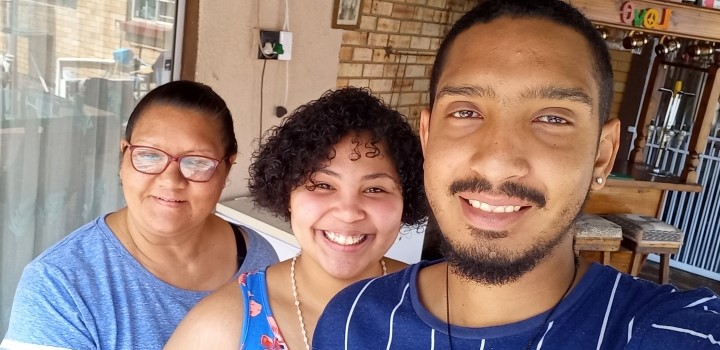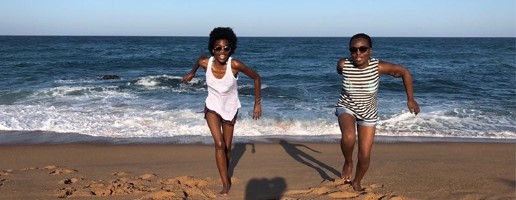Tevin celebrates adult life after a life-saving kidney transplant at age 12

When Tevin was only ten years old (in 2005), he was diagnosed with a life-threatening condition called rapidly progressive glomerulonephritis. Tevin's situation was complicated by his having an underlying and irreversible condition called autoimmune vasculitis, which triggers antibodies to attack the kidney's blood vessels.
This, says Tevin's specialist Professor Errol Gottlich, can lead to chronic kidney failure if it is not treated. Prof Gottlich is a specialist (paediatric) nephrologist at Morningside Mediclinic, Sandton, and founder and manager of Discovery Health's Kidney Care Programme. (Nephrologists specialise in diagnosing and treating problems and diseases of the kidney.)
As a child, Tevin's aching joints led to a misdiagnosis of rheumatic fever
As a young child, Tevin experienced aches in his joints, which originally led to a misdiagnosis of rheumatic fever. However, he showed little response to treatment. A sonar detected enlarged kidneys and he was referred to Prof Gottlich, who immediately put Tevin on to peritoneal dialysis. Tevin's mom, Tess, and a helper at home administered the dialysis.
Prof Gottlich also listed Tevin on a local programme for kidney-transplant recipients.
Six months later, and after several complications (including an infection in his peritoneal dialysis catheter), had to switch to hospital-based haemodialysis. This meant he had to have haemodialysis every second day at the Morningside Mediclinic - all while his name remained on the transplant list.
Understanding forms of dialysis:
- Peritoneal dialysis is a treatment for kidney failure that uses the lining of your abdomen, or belly, to filter your blood inside your body.
- Haemodialysis is a procedure where a dialysis machine and a special filter called an artificial kidney, or a dialyser, are used to clean your blood.
That was the start of a decade-long journey, during which Prof Gottlich expertly navigated around several potentially fatal twists and turns.
An explosion of joy
Then, at 04:00 one August morning in 2006, his number unexpectedly came in - and the celebratory bells and firecrackers sounded. Tess received a call that was to transform the Van der Merwe family's lives. Tevin was eleven years old at the time.
Until then, life had been extremely hard for the family. They live in Johannesburg's southern suburbs, a 40-minute trip from the Morningside Mediclinic. Tess also worked for an estate agency in Pretoria, so had to juggle her commuting to work with trips to the hospital for Tevin's four-hour dialysis sessions.
"When the phone rang so early, I was irritated, thinking it was my husband's business (an alarm company) again," says Tess. "However, the nurse patiently repeated that they'd found a donor for Tevin and that we needed to come in first thing that morning for the operation." Kevin was to receive one new kidney, which would make up for both of his diseased kidneys - and change the course of his life.
Tess started crying, then woke her husband, Sydney, to tell him the news. He also burst into tears. Overjoyed, they woke Tevin an hour later and began packing for hospital.
Says Tess, "I've never in my life seen somebody so excited to have an operation."
Tevin adds, "I don't remember much - just my dad waking me up very early in the morning. I was excited and jumping around in the back seat of the car. I couldn't wait to get to the hospital and get it over and done with."
Prof Gottlich explains the stresses faced by families who are dealing with kidney disease like Tevin's
"It's hard to appreciate how difficult this daily journey is for the family and child," says Prof Gottlich. "There are the dietary, medicine and lifestyle demands. Then there is a peritoneal dialysis catheter in the abdomen, which makes the child different from everybody else. The child loses schooling time, has to drink far less fluid than other children, and faces operations and constant, painful procedures."
Tevin also had to deal with other obstacles, including a twisted bowel and chronic diarrhoea that led to haemorrhoids. Both required operations. Tevin says the twisted bowel was "extremely painful, far worse than anything involving the actual transplant".
"It's an extremely tough physical and emotional journey, a real family project in which all parties need to be 100% committed," says Prof Gottlich. "As a treating doctor, I can tell you that family commitment makes all the difference between a successful outcome and an unsuccessful one."
Tevin does what normal teens do (but shouldn't have, in his case).
Transplant recipients need to stick to specific medical protocols all their lives to ensure their precious transplanted organ keeps working. But, as a teen, Tevin got careless and didn't take his immuno-suppressant medicine regularly - leading to a rapid deterioration of his kidney and emergency treatment.
Prof Gottlich describes Tevin's behaviour at the time as the most common cause of loss of kidney grafts (transplants) in this age group. "He did what normal teenagers do," says Prof Gottlich. "They're not overly compliant."
But today, Tevin is a model of compliance.
In Prof Gottlich's words: "He's matured to appreciate the organ he's got, and the value of life and looking after it. It's great to see how well he's done despite the very tough circumstances he's been through."
Tevin's best advice to fellow kidney patients? "Remain optimistic and believe that whatever process is outlined for you to recover will work. I never once doubted my treatment and found things to do that inspired me when I could no longer play sport. You've got to have faith."
Tevin kept his end of the bargain, stepping up to self-care with his daily medicine, and changing his diet and lifestyle. In just a few years, he went from being a telecommunications call-centre agent to full-time business-unit trainer in Johannesburg, where he and his family live.
What is Tevin's mother's message to parents in the same boat?
"Stay close to your child and really understand their medicine they take," says Tess. "Don't take anything for granted. You need to understand the condition through and through, and why your child is taking the medicines prescribed, so you can communicate with your doctor. Oh, and get all the support you can!"
Highest praise for Prof Gottlich
Tevin has his younger sister, Eden (aged 19), his mother, Tess, and father, Sydney, to thank for their unwavering commitment and the sacrifices made to help him to rebuild his life.
The family also has high praise for Prof Gottlich. His expert, compassionate care and aggressive treatment kept Tevin alive so he could receive his life-changing kidney transplant.
Prof Gottlich says the COVID-19 pandemic has had a very significant impact on people with chronic diseases, including patients with kidney disease who are on chronic dialysis. Before COVID-19, the mortality rate for patients on chronic dialysis was 13%. Prof Gottlich believes this figure is almost certain to have risen by a few percentage points in the last 18 months.
He adds: "The pandemic makes the work of the Discovery Health Medical Scheme's Kidney Care programme even more vital."
- The Discovery Health Medical Scheme's Kidney Care Programme is designed to help Discovery Health Medical Scheme members living with chronic kidney disease to manage the disease, in line with international best practice guidelines, to ensure the best quality of care and quality of life.
- Find out more about the Kidney Care programme.
Would you like to register to become an organ donor?
At any given time, up to 2 000 South African adults and children are waiting for a life-saving solid organ (heart, lung, liver, pancreas, kidney or cornea). People who choose to be organ donors can save the lives of people who need replacement organs.
By registering with the Organ Donor Foundation, you can help to save seven people's lives with your organs and 50 others with other tissues. You can register by calling them on 0800 22 66 11. Learn more by visiting the FAQs page on their website.
The Discovery Health Medical Scheme is an independent non-profit entity governed by the Medical Schemes Act, and regulated by the Council for Medical Schemes. It is administered by a separate company, Discovery Health (Pty) Ltd, an authorised financial services provider.
Related articles

Your kidneys are critical to your health
Your kidneys are vital to your survival as they filter toxins and produce important chemicals in your body. Unfortunately, kidney disease often goes undetected (nine out of 10 people with kidney disease don't know they have it). This is because many people whose kidneys do not work properly, do not develop symptoms until their kidneys are close to failing.

KidneyCare helps keep a smile on Ayanda's face
Ayanda Nxasana was born with one regular kidney and one small one, a condition that led to renal failure as a teenager. She also suffers from lupus and is dyslexic - but none of this keeps her from managing her health and staying positive.

Kidney donation transforms teenage Kaelyn's life
She is dynamic, courageous and inspiring! At only 16-years old, Kaelyn Smit has lived through kidney failure, months of dialysis and a hugely successfully kidney transplant. No wonder she hopes to become a paediatric nephrologist.